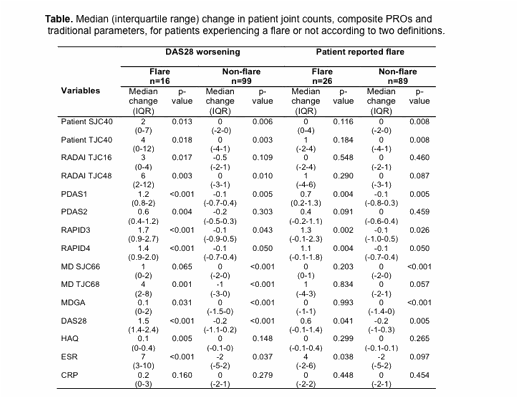Session Information
Session Type: Abstract Submissions (ACR)
Background/Purpose:
Patient-reported joint counts (JCs) have been identified as core domains for assessment of flare in rheumatoid arthritis (RA).[1]
To assess the responsiveness and discriminative validity of patient-reported JCs, separately and incorporated in composite patient-reported outcomes (PROs), for worsening of disease activity in early RA (ERA).
Methods:
Paired data from ERA patients in the Canadian early arthritis cohort (CATCH) who prospectively completed OMERACT preliminary flare questions twice over a 3-month interval between 12/2011 and 4/2013 were used. Patients reported tender (T) and swollen (S) JCs on a 40-joint homunculus and the 16-joint RA-disease-activity-index (RADAI) mannequin. Physicians assessed the TJC68, SJC66 and global assessment (MDGA). Flare was defined as: a worsening in DAS28 >1.2 (or > 0.6 if DAS28 >= 3.2) and patients answering: ‘Are you having a flare at this time?’ with no changing to yes. Median changes in patient JCs were compared between patients in a flare or not by Wilcoxon signed rank test. Discrimination of flare vs. non-flare for the patient JCs separately and incorporated into the patient-disease-activity-scores (pDAS1 and pDAS2) and routine-assessment-of-patient-index-data (RAPID4) was assessed via effect sizes (ES) and compared with ES of traditional parameters.
Results:
Of 115 eligible patients, 90% fulfilled the ACR 2010 RA criteria, 79% were female, mean (SD) age was 55 (15) years and symptom duration 5 (3) months. At the initial assessment, 46%/15% of the patients were in DAS28 remission/low disease activity, with a median (IQR) patient SJC40 and TJC40 of 1 (0-3) and 3 (1-10), respectively. Mean physician SJC66 and TJC68 were 1.9 (SD 3.3) and 4.6 (SD 6.6). After 3 months, 16 (14%) patients reported a flare and 26 (23%) experienced a flare according to the DAS28 definition. DAS28 flare was associated with a significant increase in patient JCs and PROs, physician JCs, HAQ, MDGA and ESR (Table). The composite PROs, RADAI48, physician TJCs, ESR, MDGA and patient global best discriminated flare from non-flare (ES>1) (Figure). Flare according to the patient statement was associated with a significant increase in PDAS1, RAPID3 and 4, DAS28 and ESR and was discriminated best by the PDAS1, RAPID3 and 4, and physician SJC (ES>0.8).
Conclusion:
In ERA, a change in patient-reported JCs can identify worsening of disease activity and detect flares, with highest discriminative validity when used in composite indices. Patient derived composite indices incorporating patient JCs should be considered in developing a comprehensive definition of RA flare.
Reference:
1. Bartlett SJ, Ann Rheum Dis 2012;71(11):1855
Disclosure:
K. Visser,
None;
S. J. Bartlett,
None;
C. O. Bingham III,
None;
E. Choy,
None;
D. Lin,
None;
J. Xiong,
None;
G. Boire,
None;
B. Haraoui,
None;
C. A. Hitchon,
None;
E. Keystone,
None;
J. E. Pope,
None;
J. C. Thorne,
None;
D. Tin,
None;
V. P. Bykerk,
-,
2.
« Back to 2013 ACR/ARHP Annual Meeting
ACR Meeting Abstracts - https://acrabstracts.org/abstract/changes-in-patient-reported-joint-counts-and-composite-indices-can-identify-flare-of-disease-activity-in-recent-onset-rheumatoid-arthritis/


